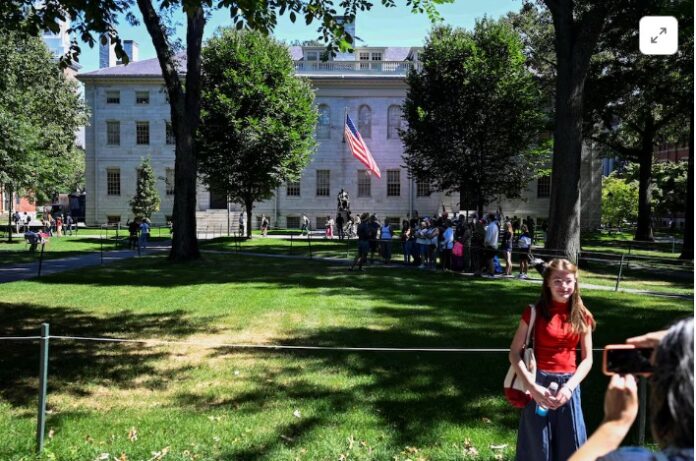On Tuesday, former U.S. President Donald Trump threatened to revoke Harvard University’s tax-exempt status, demanding the school apologize for what he described as antisemitic incidents on campus.
His remarks came a day after Harvard rejected federal demands to change its academic programs, calling them unlawful.
The Trump administration has recently targeted several universities, beginning with Columbia University, for their response to pro-Palestinian student protests. These demonstrations escalated following the 2023 Hamas-led attack in Israel and Israel’s subsequent military actions in Gaza.
Trump has denounced the protests as both antisemitic and anti-American, accusing universities of promoting Marxist and “radical left” ideologies. He has pledged to cut off federal grants and contracts to institutions that refuse to comply with his administration’s directives.
In a social media post on Tuesday, Trump questioned whether Harvard should retain its nonprofit status, claiming the university supports “political, ideological, and terrorist-inspired sickness.” However, he did not detail how such a move would be carried out. Under U.S. law, tax-exempt status is generally reserved for educational institutions serving the public interest.
White House Press Secretary Karoline Leavitt echoed Trump’s demands, urging Harvard to apologize for what she called antisemitism directed at Jewish students. She further accused Harvard and similar institutions of violating Title VI of the Civil Rights Act, which bans discrimination by recipients of federal funding based on race or national origin.
Title VI allows federal funds to be withdrawn only after investigations and hearings, including a 30-day notice to Congress—procedures that have yet to occur at Harvard or Columbia.
Critics argue that the administration is misrepresenting student protests as antisemitic in order to suppress academic freedom and political dissent.
Columbia University, a private institution in New York City, agreed to negotiate new protest policies after the Trump administration claimed to have cut $400 million in federal grants, largely used for medical and scientific research.
On Monday, Harvard President Alan Garber responded in a letter, rejecting the administration’s demands—including an audit for “viewpoint diversity” and the elimination of diversity, equity, and inclusion programs—as unprecedented and unlawful. He argued that these actions undermine free speech and violate civil rights protections.
Garber emphasized that Harvard is committed to combating antisemitism and other forms of discrimination while safeguarding academic freedom and the right to protest.
Later that same day, the administration’s Joint Task Force to Combat Anti-Semitism announced it was freezing more than $2 billion in contracts and grants to Harvard, though it did not specify which programs were affected. Harvard declined to comment.
Some Columbia professors have since sued the administration, claiming the grant suspensions violated their constitutional rights and Title VI. A federal judge has ordered the administration to respond by May 1.
Columbia’s interim president, Claire Shipman, stated that the university remains engaged in “good faith discussions” with the Justice Department’s antisemitism task force.
Several peer institutions publicly supported Harvard’s stance. Princeton University President Christopher Eisgruber expressed solidarity with Harvard on social media, encouraging readers to review Garber’s letter. Stanford University President Jonathan Levin and Provost Jenny Martinez also released a statement defending Harvard, arguing that the administration’s demands threaten the tradition of academic liberty vital to American universities.
They acknowledged the importance of addressing genuine concerns but warned that dismantling the infrastructure supporting scientific research is not the path to meaningful reform.
Separately, on Monday, a coalition of universities—including Princeton and the University of Illinois—filed a lawsuit against the Department of Energy over significant cuts to research funding, including projects in nuclear technology, cybersecurity, and medical innovation.
Since taking office in January, Trump has faced legal challenges over his immigration policies and efforts to dismiss federal employees and withhold massive amounts of government funding from states and institutions.
REF: REUTERS



















